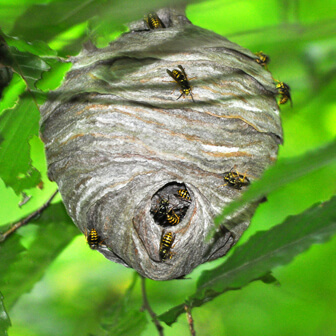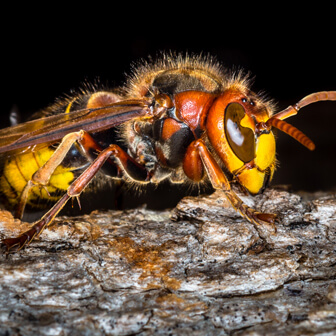- Call Us FreePress To Call Us
- 0800 046 3473 | 01727 789571
Yes, we’re called Wasp Nest Removal. But that doesn’t mean we can’t hunt down hornets and their nests too. Although less common in the UK than wasps, hornets still pose a danger. Don’t worry if you can’t tell the difference between wasps and hornets. Give us a call and we’ll come over to check out your nest, and deal with it.
For the record, if you’re not sure if you’ve got a wasp or hornet problem, here’s some wasp and hornet facts:

These should be treated in the same way as wasp stings. The best way to reduce the chances of getting stung is to reduce the number of hornets flying around by destroying their nest. We will do this for you, quickly and expertly.

The best way to control a hornet problem in your home or workplace is to call in the professionals. We’re professionals when it comes to treating hornet infestations and can do so professionally and safely.
We know where to look for hornet nests. Much like wasps, hornets like to make their home in a variety of locations from bird nest boxes, loft spaces and hollow walls to secluded corners of sheds and garages.
Stay safe from hornet stings. Don’t approach a hornet nest if you find one, whatever its size. Call Wasp Nest Removal Hertfordshire.
We’ll arrive fast and fully equipped to deal with the problem. We use the latest and most effective hornet nest treatments to destroy the nest.
July and August will see hornet nests reaching their peak size and occupancy, with the number of hornets in the colony likely to reach 500-750. That’s not something anyone without hornet nest experience and the proper equipment wants to be tackling.
We will always explain to you the nature of the insecticide treatment we use before applying it. If the nest is in an easy to reach location, Wasp Nest Removal Hertfordshire can normally do their thing within an hour. Nests in tricky to reach places may take longer to treat. But we always aim to get the job done in one visit.
Once the nest is neutralised, we’ll advise you on how to avoid having a hornet nest problem to deal with next year. After all, prevention is always better than cure.